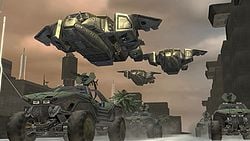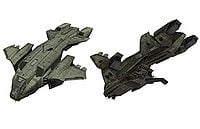Pelican: Difference between revisions
From Halopedia, the Halo wiki
(Add Unused Images) |
Dragonclaws (talk | contribs) (move image to stop it from stretching the page) |
||
| Line 14: | Line 14: | ||
[[Image:Pelican and warthog.jpg|right|250px]] | [[Image:Pelican and warthog.jpg|right|250px]] | ||
[[Image:PelicanPilots1.jpg|thumb|250px|Two Marine pilots and [[Sergeant Avery Johnson]]]] | [[Image:PelicanPilots1.jpg|thumb|250px|Two Marine pilots and [[Sergeant Avery Johnson]]]] | ||
[[Image:Pelican-TroopPod.jpg|thumb|250px|A Picture made by [[:Image:CortanaHunterScale.gif|Stephen Loftus]] showing an earlier model of the pelican]] | |||
The Pelican's cargo transporting capabilities are quite impressive. All forms of cargo are secured into place through the use of magnetic locks on the underside of the tail. Pelicans are capable of transporting one [[UNSC]] vehicle at a time. Such vehicles include the [[Scorpion]] or the [[Warthog]] (possibly a Skyhawk Jump jet with folded wings). Optional cargo can be mounted here as well, such as supplies, weapons pods, an M-779 troop bay extention container (used in [[Halo: First Strike]] to carry the [[Spartan]]s to [[Reach]]), in flight refueling pods (for refueling Skyhawks and other Pelicans) (optional fuel tanks can be caried on the wings). Fuel bladders on the other hand are carried in the "Attack" variation of the Pelican Armed with Anvil-II Missle Pods under each wing. | The Pelican's cargo transporting capabilities are quite impressive. All forms of cargo are secured into place through the use of magnetic locks on the underside of the tail. Pelicans are capable of transporting one [[UNSC]] vehicle at a time. Such vehicles include the [[Scorpion]] or the [[Warthog]] (possibly a Skyhawk Jump jet with folded wings). Optional cargo can be mounted here as well, such as supplies, weapons pods, an M-779 troop bay extention container (used in [[Halo: First Strike]] to carry the [[Spartan]]s to [[Reach]]), in flight refueling pods (for refueling Skyhawks and other Pelicans) (optional fuel tanks can be caried on the wings). Fuel bladders on the other hand are carried in the "Attack" variation of the Pelican Armed with Anvil-II Missle Pods under each wing. | ||
Enlarge troop bay. Pelican weaponry may include a pair of optional HE Anvil II missle pods (one under each wing) (each pod can fire 16 missles), a 70mm chin-mounted chain gun (a 40mm model has been used, but was outdated by the year 2525), and occasionally a rear-mounted Machine Gun Turret with optional 25mm grenade launcher operated by a crew chief (it can be folded flat against top of troop bay). The main gun is controlled via a link to the co-pilot's helmet. These weapons were not often used on Halo due to the limited amount of ammunition for them. The pilot's duties consist of handling main fight control, and getting the Pelican in and out of an insertion safely. Fire control is performed by the co-pilot. The co-pilot is also responsible for organizing and selecting targets, navigating, as well as taking over flight control should the pilot become incapacitated, or otherwise incapable of flying the Pelican safely (similar to modern attack helicopters today). In most situations, the pilot is the ranking officer and will be in command of the craft and its duties. | Enlarge troop bay. Pelican weaponry may include a pair of optional HE Anvil II missle pods (one under each wing) (each pod can fire 16 missles), a 70mm chin-mounted chain gun (a 40mm model has been used, but was outdated by the year 2525), and occasionally a rear-mounted Machine Gun Turret with optional 25mm grenade launcher operated by a crew chief (it can be folded flat against top of troop bay). The main gun is controlled via a link to the co-pilot's helmet. These weapons were not often used on Halo due to the limited amount of ammunition for them. The pilot's duties consist of handling main fight control, and getting the Pelican in and out of an insertion safely. Fire control is performed by the co-pilot. The co-pilot is also responsible for organizing and selecting targets, navigating, as well as taking over flight control should the pilot become incapacitated, or otherwise incapable of flying the Pelican safely (similar to modern attack helicopters today). In most situations, the pilot is the ranking officer and will be in command of the craft and its duties. | ||
Revision as of 23:50, September 16, 2006
Summary
Name = D77-D7 Pelican Class Dropship. Type = Dropship Armaments = 70mm chin-mounted chaingun & Anvil-II MisslePods (Both Optional) Carrier = Yes:Warthog & Scorpion }}
Pelicans are the UNSC's main troop transporting dropships. They have been the backbone of ground-based tactical troop movements since at least 2525. They are called Pelicans due to their ability to carry a large amount of personnel and cargo, as well as their vague resemblance to the Earth animal of the same name. Pelicans can be configured in a wide variety of ways, but usually are capable of carrying around 10 Marines. Every Pelican has a call sign consisting of a letter from the phonetic alphabet followed by a 3 digit number.
Ordinance Capabilities
The Pelican's cargo transporting capabilities are quite impressive. All forms of cargo are secured into place through the use of magnetic locks on the underside of the tail. Pelicans are capable of transporting one UNSC vehicle at a time. Such vehicles include the Scorpion or the Warthog (possibly a Skyhawk Jump jet with folded wings). Optional cargo can be mounted here as well, such as supplies, weapons pods, an M-779 troop bay extention container (used in Halo: First Strike to carry the Spartans to Reach), in flight refueling pods (for refueling Skyhawks and other Pelicans) (optional fuel tanks can be caried on the wings). Fuel bladders on the other hand are carried in the "Attack" variation of the Pelican Armed with Anvil-II Missle Pods under each wing.
Enlarge troop bay. Pelican weaponry may include a pair of optional HE Anvil II missle pods (one under each wing) (each pod can fire 16 missles), a 70mm chin-mounted chain gun (a 40mm model has been used, but was outdated by the year 2525), and occasionally a rear-mounted Machine Gun Turret with optional 25mm grenade launcher operated by a crew chief (it can be folded flat against top of troop bay). The main gun is controlled via a link to the co-pilot's helmet. These weapons were not often used on Halo due to the limited amount of ammunition for them. The pilot's duties consist of handling main fight control, and getting the Pelican in and out of an insertion safely. Fire control is performed by the co-pilot. The co-pilot is also responsible for organizing and selecting targets, navigating, as well as taking over flight control should the pilot become incapacitated, or otherwise incapable of flying the Pelican safely (similar to modern attack helicopters today). In most situations, the pilot is the ranking officer and will be in command of the craft and its duties.
Movement
Pelicans move by using jets on moveable wings. The wings rotate and move independently of one another in order to direct the Pelican's flight path. Each wing has a pair of jets that are faced backward for normal flight, and a pair faced down for hovering. All the jets can have different outputs and are used in combination with the angle of each wing for the desired effect. Because of this, intricate manuvers such as rolls, banks and dives are easier to do, just decrease and increase thrust to the corresponding jets as well as changing the angle of the jets themselves. These features are handled by the Pelican's computer, so the the pilots can focus more on their duties. Control of the vehicle as a whole is also quite smooth. The Pelican has a passing resemblance to V-22 Osprey's ability to perform troop and vehicular deployments and its style of fight. As well as its use of Thrust Vectoring technology that the F-22 Raptor uses today. The Pelican is capable of flying in space.
Although they're fairly manuverable, Foehammer said in Halo "these things don't turn on a dime!"
Pelicans cannot be piloted by the player, though it is possible to drive by modding, but they can be ridden in.
The Original Pelican Model is similiar to the UD-4L Cheyenne Dropship from the movie Aliens. File:Drp-blprnt schematics.jpg

